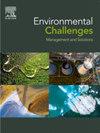双菌种联合固定化稻壳生物炭协同生物修复海洋溢油
Q2 Environmental Science
引用次数: 0
摘要
能够降解石油泄漏碳氢化合物的细菌已经被广泛发现,但由于与天然微生物的竞争,单个细菌菌株在实际环境中往往表现不佳,导致降解效率下降。在本研究中,通过将Novosphingobium sp. MCC 3051和Alcanivorax sp. MCC 4337固定在稻壳生物炭(RHB)上,开发了一种环保型的方法来去除水系统中的碳氢化合物。采用响应面法(RSM)对含碳氢化合物的修复工艺进行了系统优化。MCC 3051和MCC 4337具有高度疏水的细胞表面。遗传分析揭示了分解烷烃和芳香烃的多种代谢途径。实验表明,MCC 3051和MCC 4337在7天内完全降解短链烃(C10-C22),降解率达到97%以上。这些结果表明,MCC 3051和MCC 4337具有广泛的降解范围和高的环境适应性,具有很强的修复油污染水的前景。气相色谱(GC)分析鉴定了降解产物,表明细菌代谢和吸附在碳氢化合物去除机制中具有协同作用。这些研究结果强调了固定化MCC 3051、MCC 4337和Consortium loading稻壳生物炭(CRHB)在有效修复海洋油污染环境方面的潜力。本文章由计算机程序翻译,如有差异,请以英文原文为准。

Synergistic bioremediation of marine oil spills using dual strain consortium immobilized rice husk biochar
Bacteria capable of degrading oil spillage hydrocarbons are widely identified, yet single bacterial strains often underperform in real environments due to competition with native microorganisms, leading to decreased degradation efficiency. In this study, an eco-friendly approach was developed for removing hydrocarbons from aqueous systems by immobilizing consortium of Novosphingobium sp. MCC 3051 and Alcanivorax sp. MCC 4337 onto rice husk-derived biochar (RHB). The Hydrocarbons remediation process was systematically optimized using response surface methodology (RSM). MCC 3051 and MCC 4337 exhibited a highly hydrophobic cell surface. Genetic analysis revealed multiple metabolic pathways for breaking down both alkanes and aromatic hydrocarbons. Experimentally, MCC 3051 and MCC 4337 completely degraded short-chain Hydrocarbons (C10–C22) and achieved over 97% degradation within 7 days. These findings suggest MCC 3051 and MCC 4337 hold strong promise for remediating oil-contaminated water due to its broad degradation range and high environmental adaptability. Gas Chromatography (GC) analyses identified the degradation products, signifying a synergistic effect of bacterial metabolism and adsorption in the Hydrocarbons removal mechanism. These findings highlight the potential of immobilized MCC 3051, MCC 4337 and Consortium loaded rice husk biochar (CRHB) for efficient remediation of marine oil-contaminated environments.
求助全文
通过发布文献求助,成功后即可免费获取论文全文。
去求助
来源期刊

Environmental Challenges
Environmental Science-Environmental Engineering
CiteScore
8.00
自引率
0.00%
发文量
249
审稿时长
8 weeks
 求助内容:
求助内容: 应助结果提醒方式:
应助结果提醒方式:


